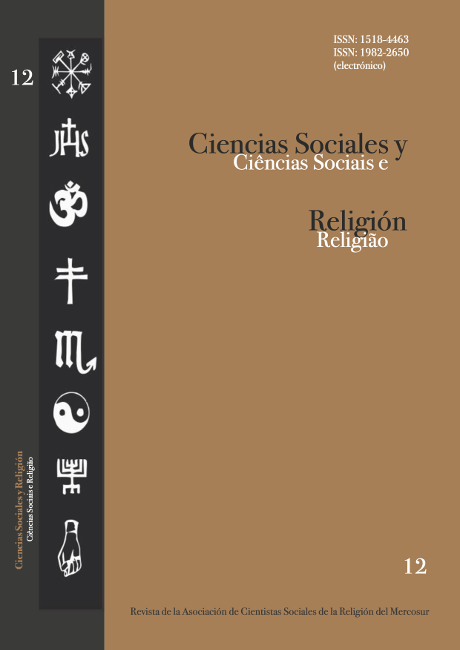Abstract
As a cumulative result of changes in the religious profile of Latin America in recent decades, the article foresees the approach of two major transitions, one Catholic and the other Protestant, in which relations between religion, state and society will be greatly modified. The Catholic transition (which may not happen in all countries of the region) refers to the tipping point at which the old socio-political roles become unsustainable. Multidimensional pluralism, numerical decline, relative institutional weakness, and the effects of democracy and the fragmenting of civil society will lead to a loss of ‘churchly’ status. In some countries, a symbolically important moment will be when the percentage of those who declare themselves Catholic falls below half of the population. Nevertheless, besides the Catholic transition there will also be a Protestant transition, which refers to the fact of a coming ceiling on Protestant growth and political aspirations. When this levelling off occurs, the nature of Latin American Protestantism will change radically, as will its relations with society, with politics and with the other religions. The article also argues for a more prominent place for Latin America in global debates on religion and modernity, since it represents a historically new evolutionary pattern for an old Christendom.
References
BLANCARTE, Roberto. Popular Religion, Catholicism and Socioreligious Dissent in Latin America: Facing the Modernity Paradigm. International Sociology, v. 15, n. 4, p. 591-603, 2000.
CASANOVA, José. Rethinking Secularization: a Global Comparative Perspective. The Hedgehog Review, v. 8, n. 1-2, p. 7-23, spring-summer 2006.
CLEARY, Edward. Shopping Around: Questions about Latin American Conversions. International Bulletin of Missionary Research, v. 28, n. 2, p. 50-55, 2004.
DAVIE, Grace. Is Europe an Exceptional Case? The Hedgehog Review, v. 8, n. 1-2, p. 23-35, spring-summer 2006.
D’EPINAY, Christian Lalive. O Refúgio das Massas. Rio de Janeiro: Paz e Terra, 1970.
EISENSTADT, Shmuel. Multiple Modernities. Daedalus, v. 129, n. 1, p. 1-29, 2000.
FRESTON, Paul. Evangelicals and Politics in Asia, Africa and Latin America. Cambridge University Press, 2001.
FROEHLE, Bryan & GAUTIER, Mary. Global Catholicism. Maryknoll: Orbis, 2003.
HAGOPIAN, Frances. Introduction: The New Landscape. In: HAGOPIAN, Frances (Org.). Religious Pluralism, Democracy, and the Catholic Church in Latin America. Notre Dame: University of Notre Dame Press, 2009a. p. 1-64.
HAGOPIAN, Frances. Social Justice, Moral Values, or Institutional Interests? Church Responses to the Democratic Challenge in Latin America. In: HAGOPIAN, Frances (Org.). Religious Pluralism, Democracy, and the Catholic Church in Latin America. Notre Dame: University of Notre Dame Press, 2009b. p. 257-331.
HAGOPIAN, Frances. The Catholic Church in a Plural Latin America: Toward a New Research Agenda. In: HAGOPIAN, Frances (Org.). Religious Pluralism, Democracy, and the Catholic Church in Latin America. Notre Dame: University of Notre Dame Press, 2009c. p. 429-466.
INGLEHART, Ronald. Cultural Change, Religion, Subjective Well-Being, and Democracy in Latin America. In: HAGOPIAN, Frances (Org.). Religious Pluralism, Democracy, and the Catholic Church in Latin America. Notre Dame: University of Notre Dame Press, 2009. p. 67-95.
LEVINE, Daniel. Pluralism as Challenge and Opportunity. In: HAGOPIAN, Frances (Org.). Religious Pluralism, Democracy, and the Catholic Church in Latin America. Notre Dame: University of Notre Dame Press, 2009. p. 405-428.
MARTIN, David. A General Theory of Secularization. Oxford, Blackwell, 1978.
MARTIN, David. Pentecostalism: the World their Parish. Oxford: Blackwell, 2002.
NERI, Marcelo. A Ética Pentecostal e o Declínio Católico. Rio de Janeiro, Fundação Getúlio Vargas, 2005.
PARKER GUMUCIO, Cristián. Education and Increasing Religious Pluralism in Latin America: The Case of Chile. HAGOPIAN, Frances (Org.). Religious Pluralism, Democracy, and the Catholic Church in Latin America. Notre Dame: University of Notre Dame Press, 2009. p. 131-181.
PRANDI, Reginaldo. Religião Paga, Conversão e Serviço. In: PIERUCCI, Antônio Flávio & PRANDI, Reginaldo. A Realidade Social das Religiões no Brasil. São Paulo: Hucitec, 1996. p. 257-273. Spirit and Power. 2006. Washington: The ew Forum on Religion and Public Life.
VÁSQUEZ, Manuel & MARQUARDT Friedmann. Globalizing the Sacred. New Brunswick: Rutgers, 2003.
VELHO, Otávio. 2000. An Assessment of the Interreligious Situation in Brazil. World Council of Churches, 2000.

This work is licensed under a Creative Commons Attribution-NonCommercial-ShareAlike 4.0 International License.
Copyright (c) 2020 Paul Freston
